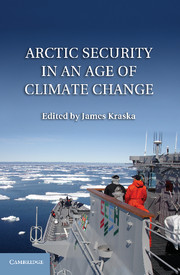Book contents
- Frontmatter
- Contents
- Figures and Tables
- Contributor Biographies
- Foreword
- Part I Introduction: Circumpolar Perspectives
- Part II European Security Interests in the Arctic
- 4 Arctic Security and Norway
- 5 Norway and the Arctic
- 6 Military Aspects of Russia's Arctic Policy
- 7 The Russian Arctic in the Twenty-First Century
- 8 The Rise of the Arctic on the Global Stage
- 9 The Arctic Challenge to Danish Foreign and Security Policy
- 10 Arctic Security
- 11 Territorial Discourses and Identity Politics
- Part III North American Security Interests in the Arctic
- Afterword
- Index
- References
6 - Military Aspects of Russia's Arctic Policy
Hard Power and Natural Resources
Published online by Cambridge University Press: 07 September 2011
- Frontmatter
- Contents
- Figures and Tables
- Contributor Biographies
- Foreword
- Part I Introduction: Circumpolar Perspectives
- Part II European Security Interests in the Arctic
- 4 Arctic Security and Norway
- 5 Norway and the Arctic
- 6 Military Aspects of Russia's Arctic Policy
- 7 The Russian Arctic in the Twenty-First Century
- 8 The Rise of the Arctic on the Global Stage
- 9 The Arctic Challenge to Danish Foreign and Security Policy
- 10 Arctic Security
- 11 Territorial Discourses and Identity Politics
- Part III North American Security Interests in the Arctic
- Afterword
- Index
- References
Summary
Introduction
Russia's Arctic policies have a strong bearing on the regional strategic environment for a number of factors. One obvious reason is the geography and the fact that Russia's Arctic shoreline covers nearly half of the latitudinal circle, which gives the country a unique potential to influence future Arctic activities. Second, despite radical changes in the regional security environment after the end of the Cold War, the Arctic and the High North (the European Arctic), in particular has maintained its central role in Russian strategic thinking and defense policy. Russia still has a strong military presence in the region, with a variety of activities and interests, despite weaknesses and problems facing the Russian armed forces. Third, and finally, Russia has enormous petroleum and other natural riches in the Arctic, and the leadership is laying on ambitious plans for development of commercial activities in the region. Understanding Russia's approaches to security is thus clearly important to surrounding Arctic nations and other stakeholders.
Russian military activity in the Arctic has tangibly increased in recent years, adding perhaps the most controversial topic in debates on the region's future security. Combined with political assertiveness and rhetorical hostility toward the West, which was a particular feature of Vladimir Putin's second presidential term (2004–2008), the intensified presence of the Russian naval and air forces operating in the region has drawn much of the international attention and contributed to the image of Russia as the wild card in the Arctic strategic equation.
Information
- Type
- Chapter
- Information
- Arctic Security in an Age of Climate Change , pp. 85 - 106Publisher: Cambridge University PressPrint publication year: 2011
References
Accessibility standard: Unknown
Why this information is here
This section outlines the accessibility features of this content - including support for screen readers, full keyboard navigation and high-contrast display options. This may not be relevant for you.Accessibility Information
- 6
- Cited by
